International efforts to help survivors of Indonesia's devastating earthquake and tsunami gathered pace on Thursday as concern grew for hundreds of thousands with little food and water, six days after disaster struck.
Desperate residents on the west coast of Sulawesi island were scavenging for food in farms and orchards as the government struggled to overcome shortages of water, food, shelter and fuel in a disaster zone with no power and degraded communications.
Chaos has loomed at times with angry people in the region's main city of Palu, 1,500 km northeast of Jakarta, looting shops and thronging its small airport, scrambling for any flight out.
The official death toll from last Friday's 7.5 magnitude quake has risen to 1,407, many killed by tsunami waves it triggered. Officials say the toll will rise.
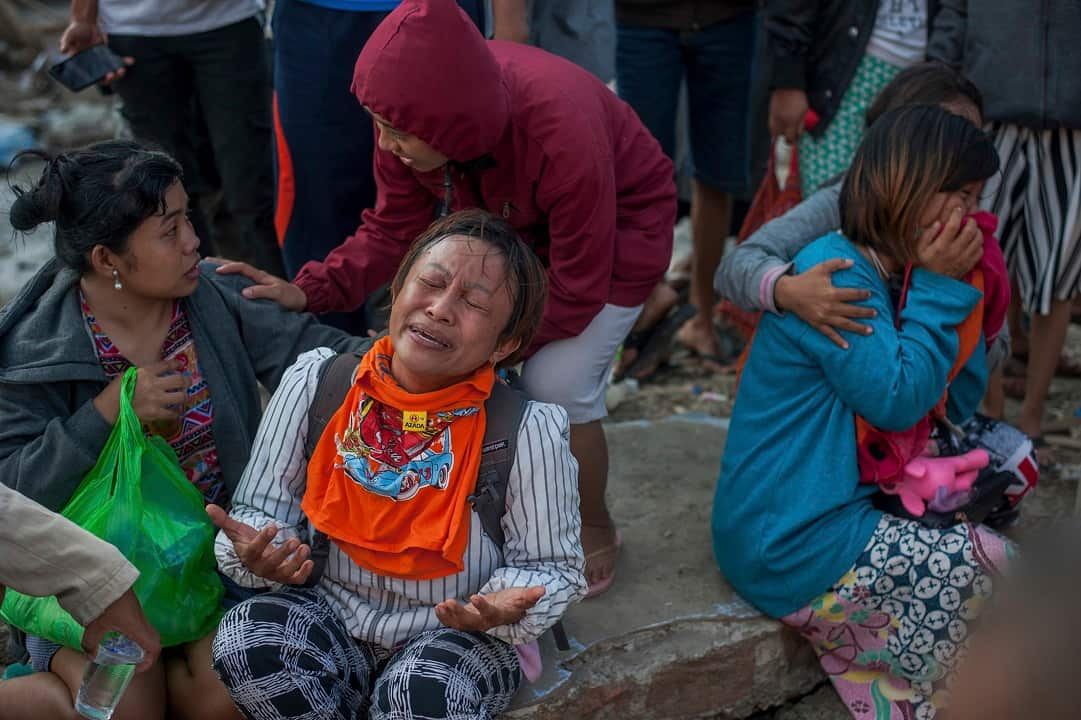
The death toll in Indonesia's twin quake-tsunami disaster has passed 1,400. Source: AAP
Most of the confirmed dead have come from Palu and losses in remote areas remain unknown. Communications are down and bridges and roads have been destroyed or blocked by landslides.
An international effort to help is gearing up, after the government overcame a traditional reluctance to take foreign help.
"The government of Indonesia is experienced and well-equipped in managing natural disasters, but sometimes, as with all other countries, outside help is also needed," UN Under-Secretary-General for Humanitarian Affairs and Emergency Relief Coordinator Mark Lowcock said in a statement.
He announced an allocation of $15 million.
"Given the scale and complexity of this emergency, UN agencies and humanitarian organisations are working closely with government counterparts to provide life-saving assistance," he said.
Growing sense of urgency
The International Federation of Red Cross and Red Crescent Societies said on Wednesday it was appealing for 22 million Swiss francs ($22 million) to help Indonesia.
US President Donald Trump spoke by telephone with Widodo and had "offered to provide immediate assistance", the White House said on Wednesday.
The United States had provided initial funding, deployed government disaster experts and was working to determine what other help could be given, State Department spokeswoman Heather Nauert told reporters in Washington.
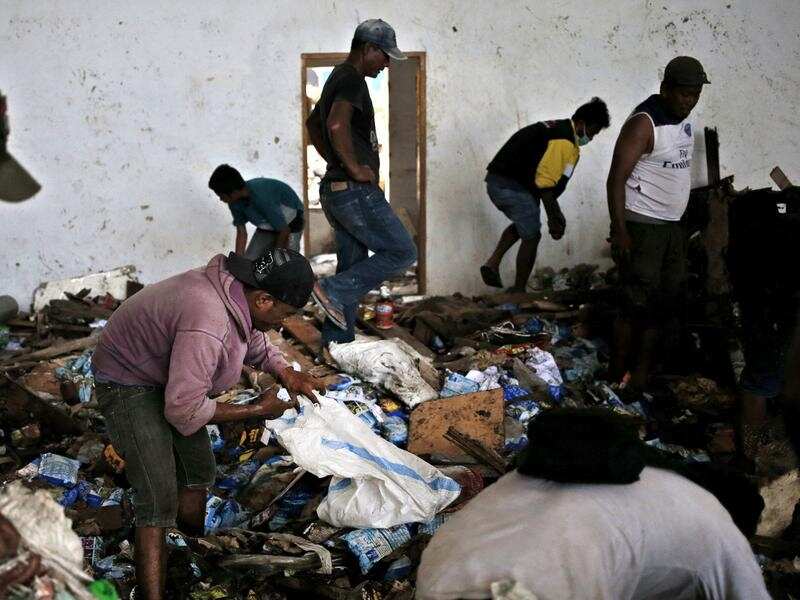
Indonesian earthquake and tsunami survivors are having to scavenge for food among the debris. (AAP) Source: AAP
About 20 countries have offered help, Indonesia has said.
With a growing sense of urgency, especially over communities still largely cut off, Widodo made his second visit to the disaster zone on Wednesday and acknowledged that the aid effort had yet to reach maximum capacity.
In particular, he cited inadequate logistics support and fuel supplies.
Also problematic has been a lack of heavy equipment for rescue workers and food, water and shelter for some 70,000 displaced people.
Rescue workers have begun to reach more remote areas in a disaster zone that includes 1.4 million people, but hundreds of thousands have received no aid.
Johnny Lim, a restaurant owner reached by telephone in Donggala town, said he was surviving on coconuts.
"It's a zombie town. Everything's destroyed. Nothing’s left," Lim said over a crackling line.
"We're on our last legs. There's no food, no water."
Sulawesi is one of the archipelago nation's five main islands.
Time running out
Time is running out to rescue survivors and the UN warning of "vast" unmet needs that have fuelled looting.
Indonesian soldiers have been ordered to fire on those raiding stores on the quake and tsunami-struck island of Sulawesi, a colonel told AFP, after desperate survivors emptied shops of food and water.
Meanwhile, the authorities have set a tentative deadline of Friday to find anyone still trapped under rubble, at which point - a week after this devastating double disaster - the chances of finding survivors will dwindle to almost zero.
Government rescue workers seeking survivors are focusing on half a dozen key sites around the seaside city of Palu - the Hotel Roa-Roa where up to 60 people are still believed buried, a shopping mall, a restaurant and the Balaroa area where the sheer force of the quake turned the earth temporarily to mush.
At a minimum, 150 people are unaccounted for beneath the rubble, officials said.
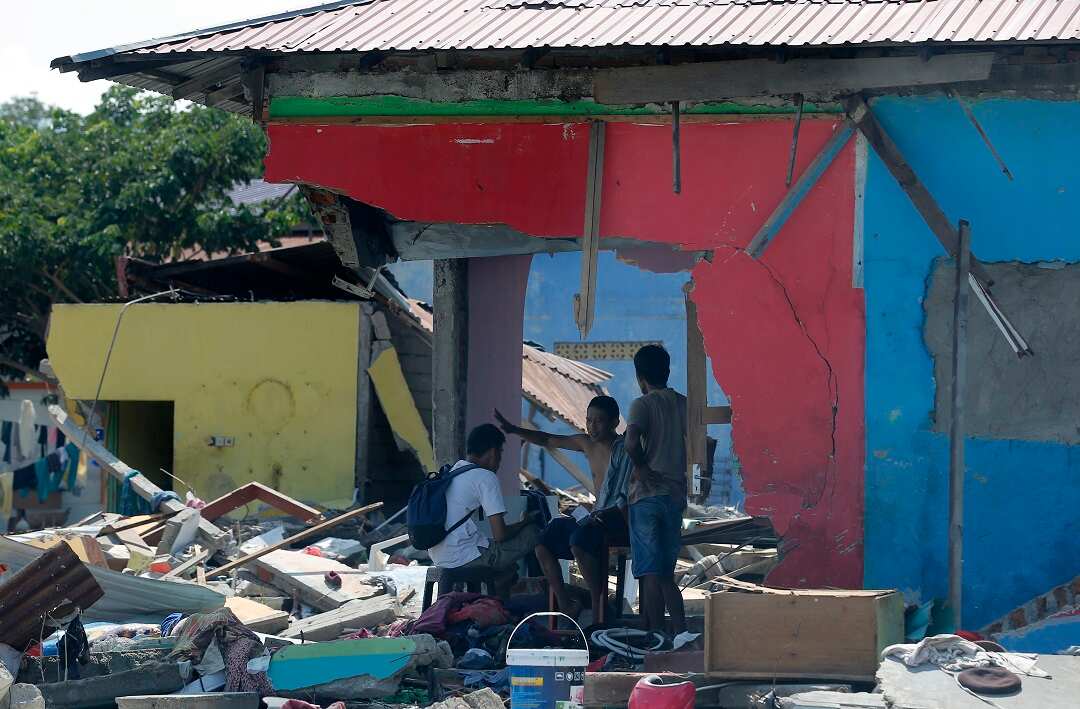
Villagers chat amongst the damage caused by the earthquake and tsunami in Palu. Source: AAP
According to the UN's humanitarian office almost 200,000 people need urgent help, among them tens of thousands of children, with an estimated 66,000 homes destroyed or damaged by the 7.5-magnitude quake and the tsunami it spawned.
Despite the Indonesian government having earlier urged foreign rescue teams to "stand down" because the crisis was in hand, residents in hard-hit, remote villages like Wani in Donggala province say little help has arrived and hope is fading.
"Twelve people in this area haven't yet been found," Mohammad Thahir Talib told AFP.
"In the area to the south, because there hasn't been an evacuation we don't know if there are bodies. It's possible there are more," the 39-year-old said.
In Geneva, the United Nations expressed frustration at the slow pace of the response.
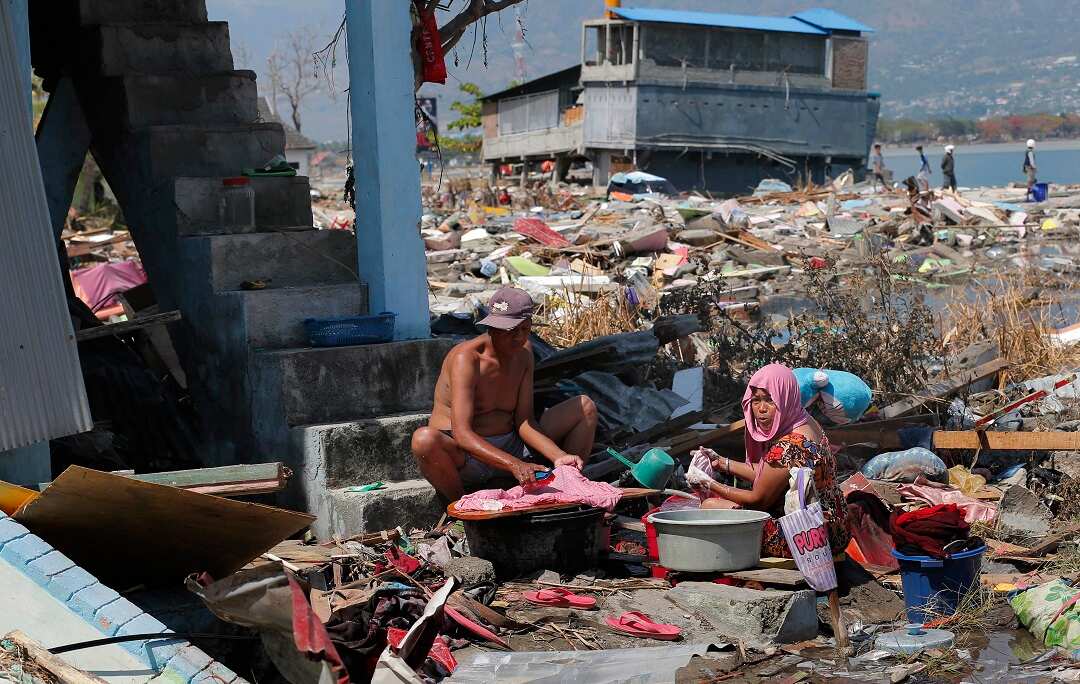
Villagers wash clothes amongst the rubble. Source: AAP
"There are still large areas of what might be the worst-affected areas that haven't been properly reached, but the teams are pushing, they are doing what they can," Jens Laerke, from the UN's humanitarian office, told reporters late Tuesday.
The World Health Organisation has estimated that across Donggala, some 310,000 people have been affected by the disaster.
Survivors are battling thirst and hunger, with food and clean water in short supply, and local hospitals are overwhelmed by the number of injured.
Officials on the ground said that while the government had now invited offers of help, there is still no "mechanism for this to be implemented".
Landing slots at Palu airport are snapped up by the Indonesian military, although it was slated to be open to commercial flights from 7:59am on Thursday.
Signs of desperation are growing, with police officers forced to fire warning shots and tear gas to ward off people ransacking shops.
"If there is looting again, we will quickly fire a warning shot and then shoot to immobilise," said military colonel Ida Dewa Agung Hadisaputra.
Six of the Indonesian social affairs ministry's trucks laden with supplies were reportedly looted en route to Palu and on one route out of the city, an AFP journalist saw youths blocking the road and asking for "donations".
On the outskirts of the city, hundreds of people sifted through the ruins of a collapsed factory, salvaging food, drinks and construction materials.
Indonesia President Joko Widodo, who faces reelection next year, insisted the military and the police were in full control. "There is no such thing as looting," he said on a visit to Palu.
Body bag shortage
As survivors pick through the shattered remains of their neighbourhoods, the death toll continues to rise.
The Indonesia-based ASEAN Coordinating Centre for Humanitarian Assistance said that more body bags were "urgently" needed as fears grow that decomposing corpses could provide a breeding ground for deadly diseases.
Rescue efforts have been hampered by a lack of heavy machinery, severed transport links and the scale of the damage.
In yet another reminder of Indonesia's vulnerability to natural disasters, the Soputan Volcano in Sulawesi erupted Wednesday, spewing volcanic ash up to 4,000 metres above the crater.
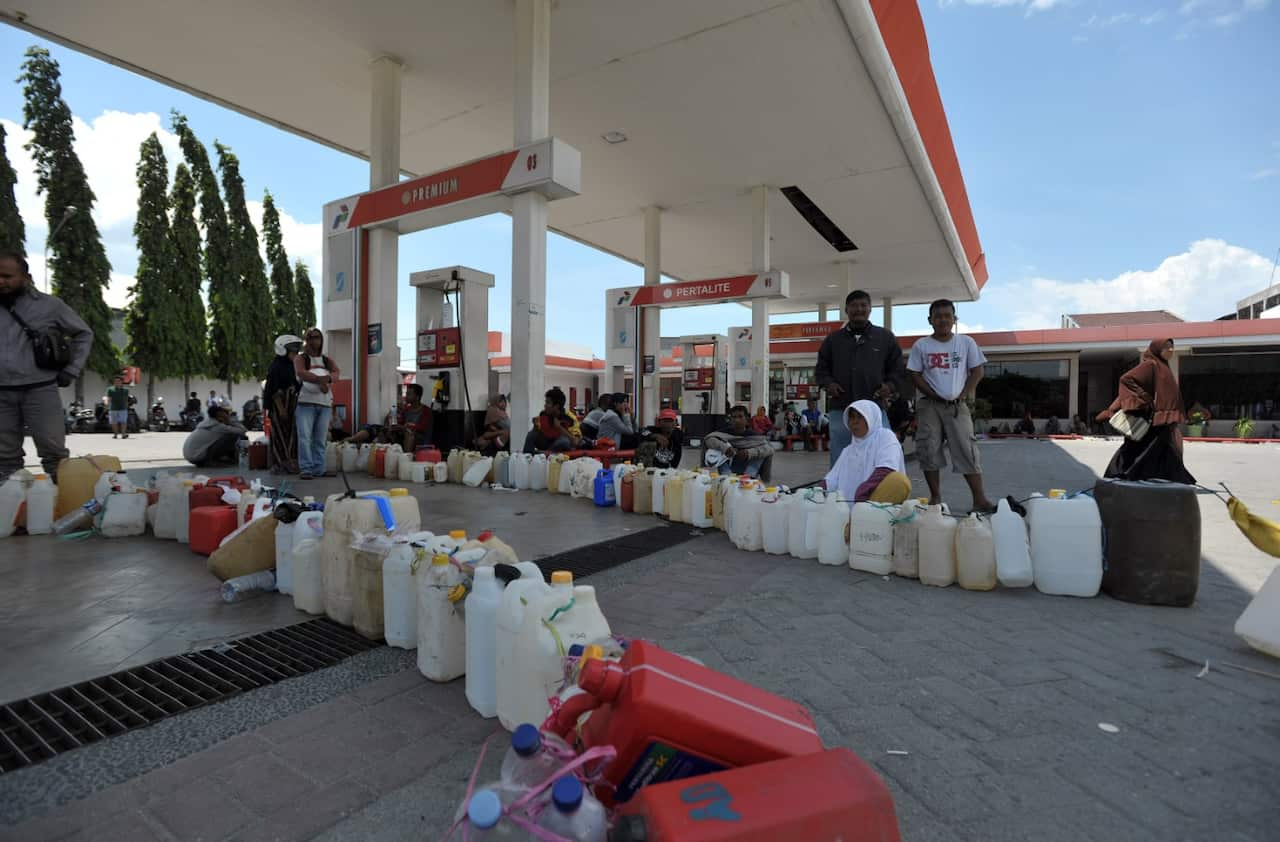
A line of bottles waiting to be filled at a gas station in the city of Palu. Source: AAP
'There's no toilet'
With power returning to parts of Palu late Tuesday, phone networks back up and running and even some markets opening for business, there were the faintest signs of things getting back to normal.
But for most, daily life has changed beyond all recognition.
Palu residents crowded around daisy-chained power strips at the few buildings with electricity or queued for water, cash or petrol being brought in via armed police convoy.
Queues to get a few litres of petrol lasted more than 24 hours in some places.
Sanitation is also a growing problem. "People everywhere want to go to the toilet but there's no toilet. So we do it along the road at night," said 50-year-old Armawati Yarmin.
Indonesia sits along the Pacific "Ring of Fire", the world's most tectonically active region, and its 260 million people remain hugely vulnerable to earthquakes, tsunamis and volcanic eruptions.
Share


